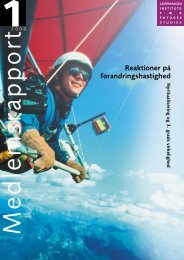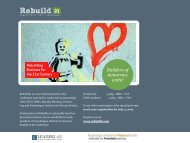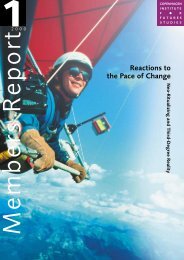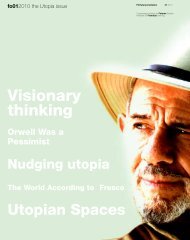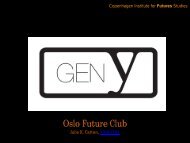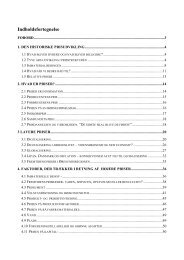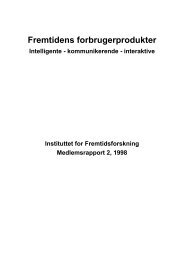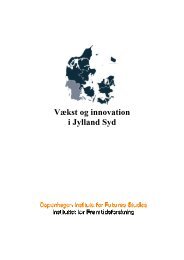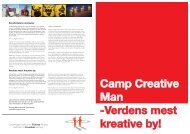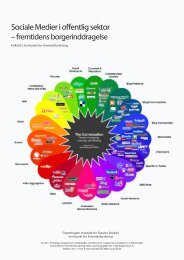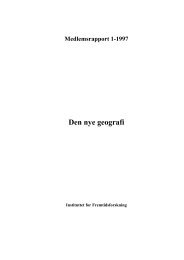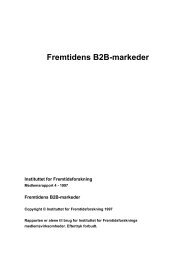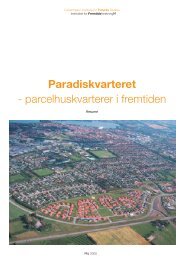Branding.
Branding.
Branding.
You also want an ePaper? Increase the reach of your titles
YUMPU automatically turns print PDFs into web optimized ePapers that Google loves.
25<br />
moving from being a citizen to becoming a consumer of social products offered<br />
by private companies. The welfare states of Scandinavia are thus increasingly<br />
supplemented by user charge. With pragmatic liberalism as the reigning<br />
zeitgeist in the Scandinavian countries, the individual has been given<br />
greater responsibility over his or her personal life.<br />
Focused leisure time and the family as stakeholders<br />
Surveys in the past decades have finally proven that people in balance with<br />
themselves are better qualified on the labour market. And, most important<br />
of all, more productive. Given this evidence, it has increasingly been acknowledged<br />
that the family is one of the company's most important stakeholders.<br />
The companies that work consciously to improve this matter fare better.<br />
Fresh surveys show that it is possible to increase productivity by as much as<br />
a third by creating optimum conditions for the individual employee. The<br />
result is a far more flexible framework.<br />
Having a family isn't a matter of course, but having children is increasingly<br />
seen as a right. It is a part of our personal evolution, and common sense besides.<br />
Our society is threatened by increasing expenses to a generation of seniors<br />
that live longer and longer. For this reason, insemination and adoption have<br />
ceased to be severe expenses for the individual and has become exceptions to<br />
the rule of more user charge. At the same time, heterosexual couples no longer<br />
have any unofficial stamp of approval as being the best-suited parents. No rational<br />
proof has been given to show that one type of family is better than others.<br />
The old boundaries have vanished. The majority tries to treat leisure<br />
time, working hours and family life as a holistic construct - though naturally<br />
with the individual as the nexus. Leisure time activities thus serve a purpose<br />
that can strengthen the individual in his or her diversity of abilities. Leisure<br />
time and vacations are thus for the majority often structured around a goal,<br />
e.g. cultural background or further education. Stimulation and learning are<br />
the primary navigation parameters in a complex world.<br />
The type of travel that best suits the individual of 2013 AD is - along with<br />
the Grand Tour - camping life, which has experienced a true comeback after a<br />
period with a rather worn image. Flexible, unbounded and cheap, it lives up to<br />
the demands of the time for individual needs and value for money. Hence, the<br />
pre-packaged trip is no longer the preferred type of vacation for Scandinavians.<br />
Analogously, night schools experience a renaissance as places where individuals<br />
can broaden their horizons and test themselves in hitherto unfamiliar situations.<br />
And the possibilities are manifold, since virtual reality allows you to visit<br />
Japan one night and the future the next. The combination of on the one hand<br />
individualisation and on the other hand rationally determined needs pulls<br />
towards a mode of living where the individual gets full value from each square<br />
metre. Technology and refined processing of materials optimise the components<br />
of construction, which become intelligent in order to adapt quickly to the<br />
individual's personality and self-chosen mode of expression. The rooms of the<br />
dwelling become multifunctional. The technology is there for that purpose, and<br />
there are no limits to individual activity in a technological wonderland.<br />
Private cars are seen as a human right. Tests are being done at approaches<br />
to major cities with special rails onto which the cars can go, after which<br />
computers take control for a while and brings the car rapidly and safely to<br />
town. This system combines the freedom of action of the personal car with<br />
the train's quick, unhindered transportation to the city centre.<br />
Sub-politics in the civil society<br />
The development in the later years has shown that the national borders continue<br />
to be challenged by the global economy. The national political systems<br />
have lost influence to the big multinational corporations.



